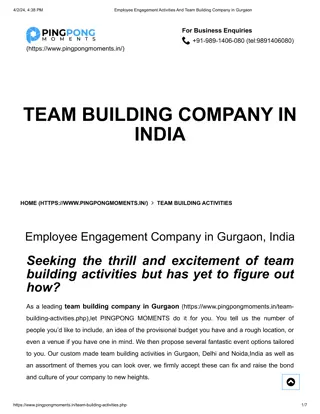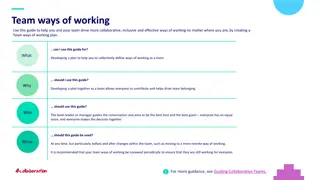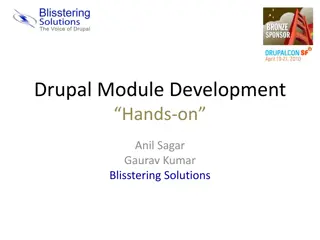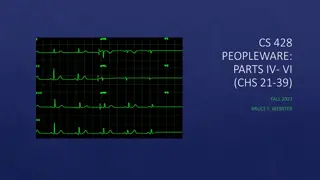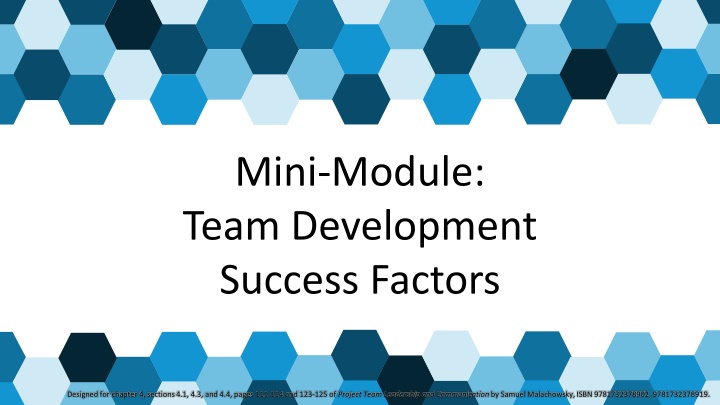
Essential Factors for Successful Team Development and Progression
Discover the key ingredients for successful team development, including complementary skillsets, shared goals, effective planning, strong leadership, appropriate motivators, and team chemistry. Explore the stages of team development defined by Dr. Bruce Tuckman and learn about the hierarchical needs of teams akin to Maslow's hierarchy. Test your knowledge on team development stages with an engaging activity.
Download Presentation

Please find below an Image/Link to download the presentation.
The content on the website is provided AS IS for your information and personal use only. It may not be sold, licensed, or shared on other websites without obtaining consent from the author. If you encounter any issues during the download, it is possible that the publisher has removed the file from their server.
You are allowed to download the files provided on this website for personal or commercial use, subject to the condition that they are used lawfully. All files are the property of their respective owners.
The content on the website is provided AS IS for your information and personal use only. It may not be sold, licensed, or shared on other websites without obtaining consent from the author.
E N D
Presentation Transcript
Mini-Module: Team Development Success Factors Designed for chapter 4, sections 4.1, 4.3, and 4.4, pages 111-114 and 123-125 of Project Team Leadership and Communication by Samuel Malachowsky, ISBN 9781732378902, 9781732378919.
What Makes a Team Successful Successful teams include one or more ingredients : Complimentary skillsets Some overlap, but intentional, effective diversity of skills Common purpose and goals All team members are aware of why their project is important Good planning Plans are clearly laid-out ahead of time, and all team members can rely on each other to follow them Effective leadership Strong leaders that match the culture of the team and project Appropriate motivators Motivators that match the culture of the team as well as the individuals on it Chemistry Chemistry is hard to define, but you ll know it when you see it
Team Development Stages Dr. Bruce Tuckman articulates 4 stages which teams must pass as they develop: Forming the team comes together, and the project gains little benefit from the team - productivity is similar to each working independently Storming clashes and disagreements begin as the team tries to determine leadership and rules for how they will work together. Productivity may drop Norming storming is lessening and the rules, or norms for the group are rapidly developing. Productivity begins to increase, the group starts to identify as a team Performing The team reaches increasing efficiency, gaining the efficiencies of working together rather than separate. The team now focuses externally on the work at hand Diagram: Malachowsky, Samuel. Project Team Leadership and Communication. Lintwood Press. 2018. p. 123. Tuckman, Bruce. Developmental sequence in small groups . Psychological Bulletin. 63 (6). p. 384 99. 1965.
Team Needs Similar to Maslow s hierarchy of needs, teams have basic needs Needs at the bottom (such as trust) must be satisfied before those higher-up can be addressed Diagram: Malachowsky, Samuel. Project Team Leadership and Communication. Lintwood Press. 2018. p. 124. Lencioni, Patrick. The Five Dysfunctions of a Team: A Leadership Fable. San Francisco: Jossey-Bass. 2002.
Activity Which Stage of Development? 1. There is quite a bit of conflict happening and team members seem unsure if the group will ever be effective The team members seem courteous, but are acting as separate individuals working independently The team feels a shared sense of purpose and identity, and outsiders recognize their ability to get things done Most conflict has subsided and many of the rules seem to be in place The project seems to be benefitting from the efficiencies of team members working together Some team members are dominating the conversation and others are afraid to speak up Which of the following team development stages to the teams on the right seem to be experiencing? 2. 3. Forming Storming Norming Performing 4. 5. 6. Tuckman, Bruce. Developmental sequence in small groups . Psychological Bulletin. 63 (6). p. 384 99. 1965.


